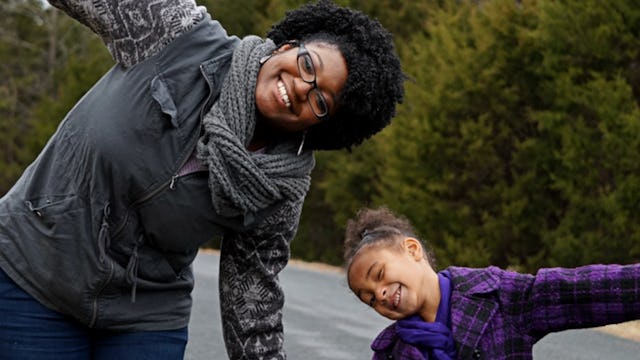The Day My Daughter Rejected My Blackness

“Mommy, I don’t want to be black like you.”
It came so unexpectedly, in the bath and beauty department of Target, while I was precariously perched on one foot attempting to get the last SheaMoisture Curl Enhancing Smoothie from the shelf overhead.
Almost instantly, I could feel the eyes of strangers upon me. It was as though a spotlight had suddenly appeared overhead, and dozens of shoppers spontaneously generated behind me, all eager to see how I would screw up this moment.
Any second I expected a voice on the intercom to come on alerting the oblivious shoppers to the incident. “Attention Target shoppers. We have a black mother dealing with an identity crisis on aisle 3. I repeat, we have a black mother dealing with an identity crisis on aisle 3.”
Of course, none of these things actually happened. In reality, I took a deep breath, took my daughter’s hands in mine, and hugged her.
Theresa Sutton
Because the truth is, in that brief moment, I was terrified. I didn’t want my daughter to be black. Because to be a black woman in 2017 is a lot of things. And none of them are easy.
It means pretending not to hear comments that are intentionally designed to provoke a reaction of you.
It means you’ll battle with double consciousness and are more likely to silently struggle with depression.
It means you’ll deal with daily microaggressions that will eat away at your self-worth.
It means struggling not to buckle under the unbelievable pressure of being the model minority.
It means that no matter how many injustices you have experienced, someone, most likely from your inner circle, will have a counter-argument at the ready designed to undermine and invalidate your experiences.
But mostly, it means your journey will be emotionally and physically exhausting.
The reality is that my daughter is so young she likely doesn’t yet understand the complexity of racial identity, or the heavy burden that comes along with being black. But she’s not so young that she’s hasn’t started to notice the subtle difference between my husband and me, namely our skin color.
And that’s why this conversation was so important. I couldn’t afford to wait until someone else took control and led my daughter down the path of self-hate.
Control the conversation, or let it control her.
Unlike myself, my daughter will have a whole new dynamic of racial identity to explore. And that’s something I can’t figure out for her. In that moment, I realized that no matter how eloquent my speech, my words could not physically protect my daughter. In a manner of speaking, biracial kids are in a giant paradox.
While they are simultaneously two different races, they are never fully able to exist as one or the other. That’s a lot to process — even as an adult.
So there, in the bath and beauty section of Target, I took a deep breath asked, “Babe, why don’t you want to be black?”
“I dunno,” she whispered, looking down at her feet.
“Being black isn’t a bad thing,” I told her. “In fact, I’m black. Right?”
She looked at me for a moment. “Yeah.”
I continued on, “And you love Mommy, right?” She nodded. “It’s just sometimes, as a black girl, you have to fight some bad guys that others don’t notice. It’s just like being a superhero. We just don’t always wear a cape.”
She looked at me thoughtfully for a moment before asking, “So if I’m black, does that mean I get a cape?”
I hugged her again. “It sure does. In fact you can get a matching one. Just like me.”
It was then that I realized it wasn’t that my daughter didn’t want to be black, she was simply struggling to deal with her perception and understanding of who she is. Realistically, I know how the world will view her, and I can’t shield her from it. What I can do is make sure she knows who she is, that she is loved, and that she loves herself, fully. I can make sure that she owns every bit of melanin in her body, no matter how much or how little.
Too often I hear other mothers proclaim “I don’t teach my children to see color,” and that worries me. The world is a colorful place — whether or not we choose to accept it.
We can either have the difficult conversations with our children while they’re younger, or wait for the world to teach them how to treat others. Color is a part of life. Just as I want my daughter to know about her heritage, I expect her to know and understand others. When you understand, you can appreciate.
As she gets older, more questions will come. I’ll be better prepared and have a more eloquent speech. Like most parenting moments, you fumble, you struggle, you prepare, and you pray that next time it gets better.
And sometimes it does.
Theresa Sutton
This article was originally published on